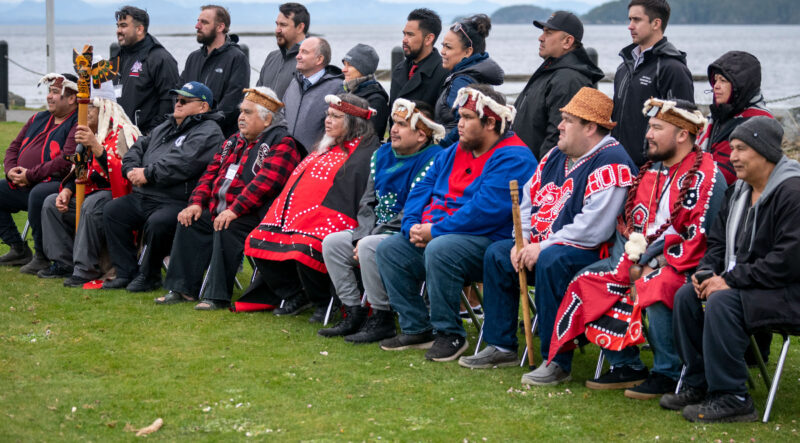First Nations to shape the future of aquaculture in BC
Canada acknowledges First Nations’ rights to define their relationships with the aquaculture industry in a plan that will shape the future of salmon farming in British Columba.
By Fabian Dawson
SeaWestNews
The future of salmon farming in British Columbia will largely depend on First Nations who want the aquaculture operations in their traditional territories.
Acknowledging First Nations’ rights to define their relationships with the aquaculture industry, the government has placed indigenous interests and reconciliation at the centre of a discussion framework, which outlines a proposed vision for open-net pen transition in British Columbia.
The framework document released yesterday said the Department of Fisheries and Oceans (DFO) will undertake a phased engagement approach which will invite First Nations, the aquaculture sector, B.C. communities, academia, and conservation organizations to provide feedback as to what should be included in an open-net pen transition plan.
The input and feedback received during these engagement sessions will be instrumental in the development and implementation of the open-net pen transition plan, expected to be finalized in the Spring of 2023.
“For First Nations in partnership agreements with aquaculture companies, this may mean maintaining local partnerships that contribute to economic opportunities for their communities,” stated the framework for discussion document.
“For First Nations concerned about impacts on migrating wild salmon populations, this may include science and stewardship focused engagement. These perspectives should be a part of the discussions related to development and implementation of a transition plan,” the document states.
“This brings both an economic and stewardship reality to reconciliation with First Nations that will shape a shared future for aquaculture in BC,” said Stewart Muir, Executive Director of Resource Works, which recently convened the Indigenous Partnerships Success Showcase in Vancouver (IPSS).
“It should provide a method for the First Nations whose rights are at stake to define their future aspirations in the context of sustainable aquaculture,” said Muir.
The BC Salmon Farmers Association (BCSFA) said it is pleased to read language in the proposed transition discussion framework that aligns with its current operational values.
“While elements of the proposed framework are challenging, given the ambitious timeline set out, we are encouraged that the federal government will rely on reconciliation and peer-reviewed science as a foundation for planning,” it said in a statement.
Currently, 20 BC First Nations have partnership agreements for farming salmon in their territory producing 78% of all salmon farmed in the province. Aquaculture is B.C.’s largest agricultural export and its production represents 60% of Canada’s total salmon production.
Prior to yesterday’s announcement, First Nation leaders from British Columbia’s coastal communities were already demanding that they be allowed to operate salmon farms in their traditional territories, saying the marine aquaculture operations have brought them out of a dark era of depression, poverty, and suicides.
The Coalition of First Nations for Finfish Stewardship (FNFFS) has also released an analysis that showed the direct economic benefits from salmon farming to First Nations in coastal BC exceed $50 million annually through more than 276 full time jobs, benefit payments, and contracts with indigenous-owned companies.
In total, when indirect and induced economic activity is factored in, First Nation interests in BC’s farmed salmon sector on and off reserves are estimated to generate $83.3 million in economic activity, $47.8 million in GDP, and 707 jobs earning $36.6 million in wages per year.
The coalition has also said transitioning to land-based salmon farming is not an option for aquaculture-dependent coastal indigenous communities in British Columbia.
Among the First Nations already asserting traditional rights to farm salmon is the Gwa’sala-‘Nakwaxda’xw Nation (GNN). In a live-streamed public event last June GNN leaders said that they plan to take over fisheries and aquaculture licensing in their traditional territories.
“Gwa’sala-’Nakwaxda’xw Nation is firm: we have authority to make decisions across our own traditional territory, as do other Nations,” said GNN Chief Terry Walkus.
The Kitasoo Xai’xais Nation, which has been raising Atlantic salmon in partnership with Mowi Canada West for decades, has independently declared a new Marine Protected Area (MPA) for greater control of its territorial waters.
Last May, the Ahousaht, one of BC’s largest First Nations, renewed a five-year agreement with Cermaq Canada, which provides the salmon farmer a road map on how it will conduct its marine aquaculture operations in the indigenous community’s traditional territory.
The discussion framework announced Friday, comes after several court decisions and a range of scientific studies that found open-net salmon farming in B.C. and neighbouring waters pose no more than a minimal risk to wild salmon.
It will help DFO shape a transition plan built on four objectives:
• Create a pathway for existing aquaculture operations to adopt alternative production methods that minimize or eliminate interactions between farmed and wild salmon;
• Improve transparency on how the government assesses and responds to new scientific information to build confidence and trust in how aquaculture is managed;
• Provide greater opportunities for collaborative planning and decision-making with First Nations partners; and,
• Advance innovation and attracting investment to support the adoption of alternative production technologies in British Columbia.
“A well-developed transition plan is the first step to growing a viable and sustainable aquaculture industry in British Columbia,” said Joyce Murray, Minister of Fisheries, Oceans and the Canadian Coast Guard.
(Image shows members of the Coalition of First Nations for Finfish Stewardship)

